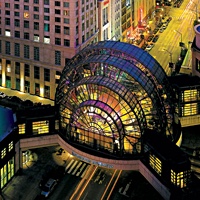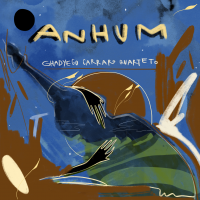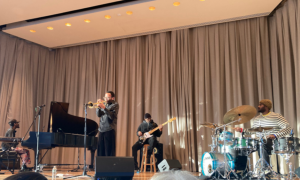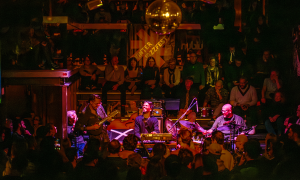Home » Jazz Articles » Live Review » 2023 American Pianists Awards
2023 American Pianists Awards

Courtesy Mark Sheldon
Indianapolis, Indiana
April 20-22, 2023
The mission of the American Pianists Association is "to discover, promote and advance the careers of young, American, world-class jazz and classical pianists." One of the major activities in that mission is the bi-annual competitions run by the Association, alternating classical and jazz artists. The process spans 13 months: the Preliminary Round, Premiere Series, and Discovery Week are all adjudicated, and the contestant with the highest cumulative point total is declared the winner. Finalists Esteban Castro, Paul Cornish, Thomas Linger, Caelan Cardello and Isaiah J. Thompson appeared in various musical contexts during the culminating Discovery Week.
The first event was Thursday's Community Concert, a free, non-adjudicated set of solo piano performances which took place at Christ Church Cathedral. It offered a unique perspective on the playing styles and repertoire choices of the five finalists. They each played two tunes, which were announced from the stage. Caelan Cardello was up first. He hails from Teaneck, New Jersey, and recently finished his Jazz Performance degree at Wiliam Paterson University, He opened with "Stuffy" by Coleman Hawkins, which Thelonious Monk used as the basis for his rarely heard Thanksgiving tune "Stuffy Turkey." There was a slow, rubato introduction (which still included big showy chords and fast runs), and the tune included stride-style left-hand runs and walking bass. Cardello went to his mentor Harold Mabern for "Wayne's Blues," which was dedicated to saxophonist Wayne Shorter. It was a brilliant piece, even if it did not sound much like Shorter's idiosyncratic music.
Esteban Castro is from New York, attends the Juilliard School, and is a Young Steinway Artist. He has won numerous competitions, including a classical one, playing Prokofiev's First Piano Concerto. He began with the standard "Body and Soul," including some surprising harmonic and melodic choices. A sprightly version of Cole Porter's "Just One Of Those Things" included plenty of filigrees in both hands.
Paul Cornish is based in Los Angeles and was awarded a fellowship to attend the Herbie Hancock Institute of Jazz at UCLA. Having grown up as a regular church attendee in Houston, he thought he should play a hymn. "When We All Get To Heaven" was built on a walking bass line and alternated between a straight rendition of the hymn and jazz improvisation on it. John Coltrane's "Giant Steps" is a rite of passage for jazz musicians, but he approached it in a more artistic way, focusing on the melody rather than speed or virtuosic display,
Thomas Linger is based in New York, and is originally from Waynesville, North Carolina. He won the 2017 American Jazz Pianist Competition after graduating from the University of North Carolina at Greensboro. His set started with a Barry Harris tune that included clapped accents with audience participation. The title tune of McCoy Tyner's Inception (Impulse!, 1962) preceded Tyner's time with saxophonist John Coltrane and was very pianistic, incorporating lots of two-handed chords.
Finally, Isaiah J. Thompson began with Thelonious Monk's "Ask Me Now." After easing into the head, Thompson played some elaborate passagework. He commented that the competition was fun because pianists don't hang out a lot, since there is only one per gig (unlike horn players). He closed the piano solo segment with George Gershwin's "Oh, Lady Be Good."
The public event continued with a Blindfold Test presented by DownBeat. The test has been the most popular feature in the magazine since it was introduced in 1950. This version featured journalist and producer Mark Ruffin testing 2015 American Pianists Award winner Sullivan Fortner (who was also a judge in the Finals). The Blindfold Test is a listening test that challenges the artist to discuss and identify the music and musicians performing on the selected recordings. No information is given prior to the test. In the introduction, Fortner said that his dad had wanted him to do pre-med, but he was accepted to Oberheim for music performance. He gave everyone in the test 1,000 stars, just for playing jazz.
The first choice could have been a stumper, but the pianist immediately recognized Tommy Flanagan, playing "Beat's Up" from his debut album Overseas (Prestige, 1958). New Orleans staple Allen Toussaint took things away from jazz. A track from Duke Ellington's album Ellington's Uptown (Columbia, 1953) prompted a comment about jazz as classical music. Noting that there were recurring musical ideas in some of Ellington's solos, Fortner observed that "it's OK to play something more than once." Nat King Cole's performance of Juan Tizol and Duke Ellington's "Caravan" stumped Forner and the audience alike, but it prompted a comment about Cole's massive influence on jazz piano (which people often forget because of his later success as a vocalist). An Ahmad Jamal track led to a stumper from Japanese keyboardist/composer Hiromi (who Jamal had recommended to the Telarc record label). A Latin-oriented Herbie Hancock tune caused some difficulties in identification, but the final track was especially hard to identify. Ruffin gave the hint that it was someone from Fortner's generation who was not known as a pianist. It turned out to be trumpeter (and multi-instrumentalist) Nicholas Payton.
Friday night's event was the Club Finals at The Cabaret. It was comprised of two sets each from the finalists, including solos and trio selections with drummer Kenny Phelps and double bassist Nick Turner. The emcee was Sylvia McNair, a vocalist with a long career on opera, concert and musical theater stages, who was making her debut working for the jazz competition. Caelan Cardello began Set 1 with the Cole Porter standard "All of You," opening with a rhapsodic unaccompanied introduction before bringing in the trio and building up to a fast swing feel. He commented that "the pressure is on" before launching into his solo feature "Don't Blame Me." The band launched right into Kenny Barron's "New York Attitude," a fast bebop tune with plenty of the titular attitude (Cardello had mentioned that it was always a good thing to have in your back pocket). Thomas Linger's first tune "Sweet and Lovely" was given a modal treatment, alternating with swing. Linger's composition "Blue Hibiscus" was a bossa nova, which Phelps accentuated by playing his drum kit with his hands. The solos on Cole Porter's "It's All Right With Me" featured the first of many instances of trading fours with the drums. Phelps was so good at this that it became a recurring event in both sets.
Esteban Castro surprised by beginning his set with an unaccompanied version of "You Go To My Head." Thelonious Monk's "In Walked Bud" had great energy from the trio. Before concluding with "Moonlight in Vermont" Castro acknowledged his mother in the audience and dedicated the performance to the late Ahmad Jamal. Paul Cornish began with trumpeter (and Indianapolis native) Freddie Hubbard's "Intrepid Fox." He said that this performance was a dream come true for him (having watched the competitions for years) and commented on Hubbard's greatness as a composer. He joked that the title of his composition "Star Is Born" did not refer to him, but was inspired by the Lady Gaga remake of the film A Star Is Born. Isaiah J. Thomson opened his set with his "Citizen of the Blues," an up-tempo blues with another great drum solo. He praised the rhythm section for their dedication in accompanying each of the pianists with such care. And he celebrated his mother's birthday, as she was also in the audience. The ballad "The Nearness of You" featured a beautiful, rhapsodic introduction.
The second set presented the finalists in a different order. Highlights included Castro's composition "Indigo Flurries" (which he confessed to having written during history class); Cornish's version of pianist Geri Allen's "Dolphy's Dance" (he spoke about continuing her legacy, along with other women jazz artists like Carla Bley); Thompson's performance of Johnny Hodges' "Funky Blues" (which was funky during his introduction, and got even funkier when the band joined in); Linger's blazing piano solo on Bud Powell's "Wail;" and Cardello's entire final set. It included his tribute to the New York club the Knickerbocker, as well as compositions by Cedar Walton and his mentor Harold Mabern, and was notable for swinging hard and avoiding excessive pianistic display. It received a well-deserved standing ovation.
Saturday night's Gala Finals were emceed by pianist Bill Charlap. They included a video welcome from 2019 winner Emmet Cohen (who was performing that night in Charlotte, NC) and an in-person appearance by 2011 winner Aaron Diehl (who related the excellent ensemble performance advice he once received: "listen to yourself last"). The first part of the concert presented duets on American Songbook standards with vocalist Cecile McLorin Salvant.
Isaiah J. Thompson accompanied Kern and Hammerstein's "Nobody Else But Me," which included a playful coda (perhaps a sign of Salvant pushing her accompanist in an unexpected direction). Esteban Castro played Rodgers and Hart's "I Didn't Know What Time It Was," which featured a chorus that again seemed very playful. Duke Ellington's "Sophisticated Lady" got a rhapsodic treatment from Thomas Linger. Salvant's vocal performance prompted praise for her fearlessness from Charlap. In his introduction to Billy Strayhorn's "Lush Life" he commented on the remarkable sophistication of the teenage Strayhorn. Paul Cornish began the arrangement freely; the rubato feel gave way to strict time with the line "life is lonely..." It was a gorgeous performance, prompting Charlap to observe that it takes a lot of preparation to be that spontaneous. Caelan Cardello and Salvant gave Cole Porter's "All Through the Night" a bright, extroverted treatment to conclude the vocal program.
The second part of the concert presented commissioned big band arrangements by Brent Wallarab and the Buselli-Wallarab Jazz Orchestra. They were like mini piano concerti, designed to spotlight each of the piano soloists, and were developed in consultation with them. One could imagine a more extended performance incorporating additional solos from orchestra members, who were cast primarily in an accompaniment role during the competition. Cardello began with "Lush Life," a surprising repeat number from the vocal program. It was a very different arrangement, however, beginning with piano and horns before a florid unaccompanied piano statement of the theme. Thompson chose a high-energy interpretation of Randy Weston's "Hi-Fly." Cornish was featured on Chick Corea's "Windows." He first did a bit of muting inside the piano, then was joined by the orchestra; the head was played by the piano trio, then with the orchestra. Linger's "Monk Medley" began unaccompanied with the rarely heard "Brake's Sake" before the orchestra came in, moving on to "Pannonica." The medley ended with a rollicking version of "In Walked Bud." Castro played Cedar Walton's "Hindsight," which included an unaccompanied piano spotlight. A fitting close to a program primarily focused on modern jazz composed by pianists.
Following the performances there was a retrospective video presentation of the five finalists during their year of competition, followed by remarks, welcomes, introduction of the jury, and presentation of gifts to the finalists. The jurors for the finals were Cyrus Chestnut, pianist/composer/producer, and Master Instructor at Howard University; Bill Cunliffe, pianist/composer; Sullivan Fortner, pianist/composer and winner of the 2015 American Pianists Awards; Rio Sakairi, Artistic Director and Director of Programming at The Jazz Gallery (NYC); and Will Wakefield, Senior Director of A+R at Mack Avenue Records. And finally, the big reveal: the 2023 American Pianists Award winner and recipient of the Cole Porter Fellowship in Jazz is Isaiah J. Thompson.
Tags
Live Review
Isaiah J. Thompson
Mark Sullivan
DL Media
United States
Indiana
Indianapolis
Esteban Castro
Paul Cornish
Thomas Linger
Caelan Cardello
Coleman Hawkins
Thelonious Monk
Harold Mabern
Wayne Shorter
Cole Porter
Herbie Hancock
John Coltrane
Barry Harris
George Gershwin
Sullivan Fortner
Tommy Flanagan
duke ellington
Nat King Cole
Juan Tizol
Ahmad Jamal
Hiromi
Nicholas Payton
Kenny Phelps
Nick Turner
Sylvia McNair
Geri Allen
carla bley
Johnny Hodges
Bud Powell
Cedar Walton
Bill Charlap
Emmet Cohen
Aaron Diehl
Cecile McLorin Salvant
Billy Strayhorn
Brent Wallarab
Buselli-Wallarab Jazz Orchestra
Randy Weston
Chick Corea
CYRUS CHESTNUT
Bill Cunliffe
PREVIOUS / NEXT
Isaiah J. Thompson Concerts
Support All About Jazz
 All About Jazz has been a pillar of jazz since 1995, championing it as an art form and, more importantly, supporting the musicians who make it. Our enduring commitment has made "AAJ" one of the most culturally important websites of its kind, read by hundreds of thousands of fans, musicians and industry figures every month.
All About Jazz has been a pillar of jazz since 1995, championing it as an art form and, more importantly, supporting the musicians who make it. Our enduring commitment has made "AAJ" one of the most culturally important websites of its kind, read by hundreds of thousands of fans, musicians and industry figures every month.




























